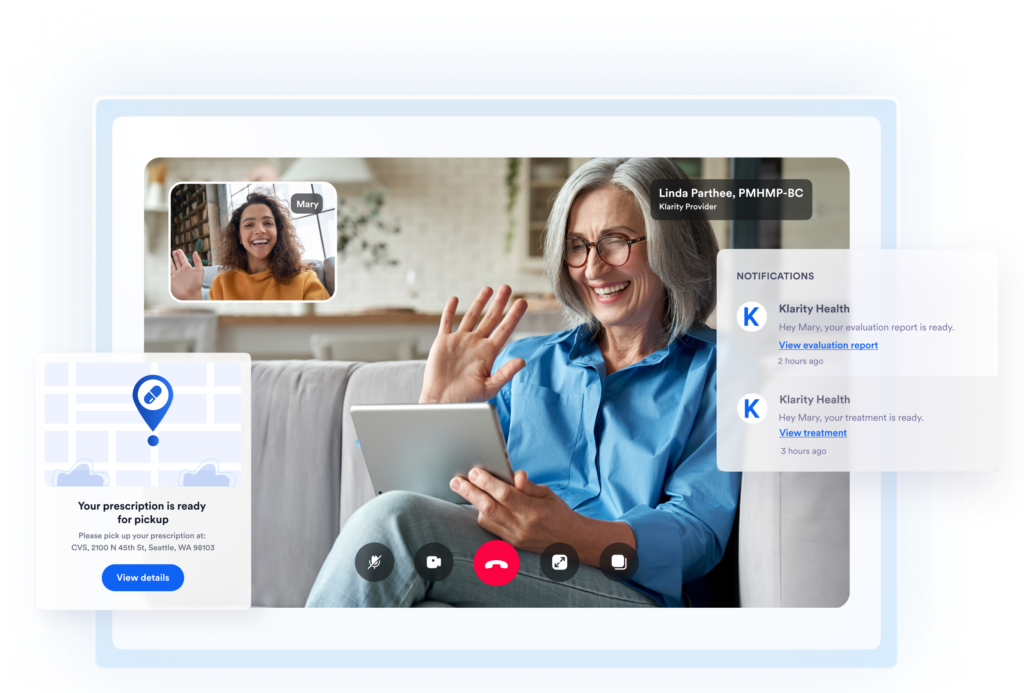Looking for an ADHD therapist online can present challenges, especially when it comes to vetting therapists that offer telehealth. However, it’s crucial not to let the challenges discourage you and learn which resources you can trust.
In this article, we share some insightful strategies that will guide you in finding the ideal online ADHD therapist.
Ready to schedule an appointment with a reliable and experienced online ADHD therapist? All healthcare providers on Klarity are licensed, certified, and experienced in treating ADHD and related mental health concerns, such as anxiety and depression. Find a provider today and meet with them in as little as 48 hours.
Licensed providers on Klarity provide personalized treatment. Find a provider that matches your needs and preferences.
Do You Have ADHD?
All adults at some point find themselves procrastinating or being distracted, annoyed, or forgetful. When these otherwise common symptoms impact your work or home life, it’s possible you have ADHD. There’s no one single way to know for sure, but the first step is to begin with a professional diagnosis.
Getting an ADHD Diagnosis Online
Getting an ADHD diagnosis has never been easier with the innovations of telemedicine. If you’re wondering if you have ADHD and are looking for a diagnosis, it’s easy to make an online appointment to speak with a certified professional from the comfort of your own home. Start by taking our free online ADHD test and get connected with a medical professional today.
Find an Online ADHD Specialist
If you’re looking for an online ADHD specialist, Klarity can help. Our platform connects you to certified and licensed medical professionals and therapists so you can get an ADHD evaluation, diagnosis, and customized treatment plan — all from the comfort and convenience of your living room. We also have one-click prescription refill services and appointment booking, so you’ll always have the resources you need at your fingertips.
Review Your Medical History
During your online assessment, a medical professional interviews you to gather information about your symptoms and review your medical history, including ADHD medications you may have previously taken. Make sure to have your medical history available, as this information will help inform the diagnosis.
Be Honest About Your Symptoms
The interview is the most important part of the evaluation. Be as honest as you can about your symptoms and how they affect your daily life, work, and relationships. The more information you can provide, the more accurate the diagnosis.
Treatment for Adult ADHD
There is no single treatment for adult ADHD—success usually comes with a combination of methods. Medication is a standard route which means it’s usually in the form of stimulants, although there are non-stimulant alternatives.
Talk therapy is another key component of ADHD treatment. A medical professional will work closely with you to find the exact combination of these methods that fit your exact mental health needs.
Medication
Medication is the most common form of treatment when it comes to adult ADHD. Most ADHD medications are formulated to help regulate brain chemistry by balancing the amount of dopamine, norepinephrine, and other neurotransmitters that regulate things like cognitive function, mood, digestion, and circadian rhythms.
These medications come in stimulant and non-stimulant forms, with a variety of options in each category. Everyone’s biology is a little different, which means this variety helps ensure more people can find ADHD medication that works for them.
Stimulants
Stimulants are often the first choice of treatment for adult ADHD because they tend to work the best for the majority of people. The common practice is to start on a low dose and then increase it every seven days until you feel like your symptoms are under control without too many side effects.
Commonly prescribed ADHD stimulants include Adderall, Vyvanse, Ritalin, and Concerta.
Other Medication
Depending on the person, stimulants may not be a viable option. Some experience negative side effects from stimulant medications and are instead prescribed other non-stimulant medications and antidepressants for their ADHD. In addition, there are ADHD-specific non-stimulant medications, like atomoxetine (Strattera), which is the first non-stimulant drug approved just for ADHD. While the effects are not as pronounced and immediate as stimulants, some people find it works just as well.
In addition, ADHD can coexist with other mental health issues such as anxiety or depression. Your online therapist can prescribe medication that effectively treats both your ADHD and comorbid conditions.
Medication Misuse Warning
When it comes to ADHD medications, many are classified as controlled substances. This means the medications have the potential for abuse and can cause physical or psychological dependence if not used properly.
Controlled substances are regulated and dispensed under strict guidelines to prevent misuse. Adderall, Ritalin, and Vyvanse fall under this category, emphasizing the importance of using them responsibly and as prescribed by your healthcare provider.
To safely harness the benefits of ADHD medications, it’s essential to adhere to prescribed dosages exactly and regularly communicate with your healthcare provider about any side effects to ensure safe and effective treatment.
Talk Therapy
A mental health professional will help you decide what type of therapy is best for managing your ADHD. There are two types of talk therapy that people with ADHD commonly benefit from:
Cognitive Behavioral Therapy (CBT)
Cognitive Behavioral Therapy, or CBT, is a type of talk therapy in which the main goal is to get people to think about their thoughts, feelings, and behavior. While not specifically designed for ADHD, it’s been proven to be helpful for some people, especially if they also exhibit symptoms of anxiety or depression.
Dialectical Behavioral Therapy (DBT)
Dialectical Behavioral Therapy, or DBT, is an effective approach to treating ADHD and related issues such as emotion regulation. When patients with ADHD struggle with sitting still and focussing, DBT can help them learn to concentrate on the present moment, modify ineffective behaviors, and reduce their symptoms. It helps foster the structure and skills needed to better balance attention and behavior and guidance on how to apply these skills to unique situations in your life.
Multimodal ADHD Treatment
Multimodal ADHD treatment refers to a comprehensive approach to managing your ADHD. This involves using many different types of treatments, such as medication, therapy, skill training, coaching, and support groups. This type of treatment is used to find the perfect mix to help someone manage their ADHD where one form of treatment may not be sufficient.
Finding an Online ADHD Therapist Through Klarity
Finding ADHD therapy doesn’t need to be a difficult process—and with Klarity, it isn’t. We connect people like you with trusted online ADHD specialists to ensure you get the treatment you need. The medical experts on Klarity are licensed and certified to provide you with the best possible care for your ADHD.
Get Diagnosed and Get ADHD Treatment Online
If you believe you may have ADHD and are seeking reliable treatment options, Klarity serves as a gateway to connect you with board-certified healthcare providers for high-quality online ADHD treatment.
With us, you get the convenience of accessing mental healthcare from the comfort of your own home, without losing the quality care provided by knowledgeable experts who understand your unique needs. The providers on Klarity are qualified to diagnose and treat ADHD—all online.
Don’t wait—find a provider on Klarity today.







